7 Nov 2013 | Digital Freedom
The Intelligence and Security Committee of Parliament is today holding its first ever Open Evidence Session. The witnesses are the three heads of the UK intelligence Agencies: Sir Iain Lobban, director of GCHQ; Sir John Sawers, chief of the Secret Intelligence Service (MI6); Andrew Parker, director general of MI5.
The session, according to the Committee, “represents a significant step forward in terms of the openness and transparency of the Agencies. The Committee will be questioning the witnesses on the work of the Agencies, their current priorities, and threats to the UK.”
Yet, open public hearings on the role of the intelligence agencies is commonplace in the US and other democracies where the legislature has a much more established role in overseeing these agencies.
It is also worth noting which committee the troika of intelligence agency heads have agreed to speak in front of – not the Home Affairs Select Committee (led by a member of HM Opposition) – but a committee whose chair is picked by the executive. It is hardly as if the ISC are arms-length from the workings of the executive either, under the last government Hazel Blears MP was a former Minister of State at the Home Office, Paul Goggins MP was a Parliamentary Under-Secretary of State at the Home Office and two other members, Lord Lothian and Malcolm Rifkind MP have held positions at the Foreign Office.
With international tension mounting on the UK’s Tempora programme and growing European anger at the UK government for engaging in mass surveillance, will the committee do enough to scrutinise the programmes?
We will be live-tweeting highlights of the hearings @indexcensorship beginning at 2pm.
7 Nov 2013 | Africa, News
1) Angola
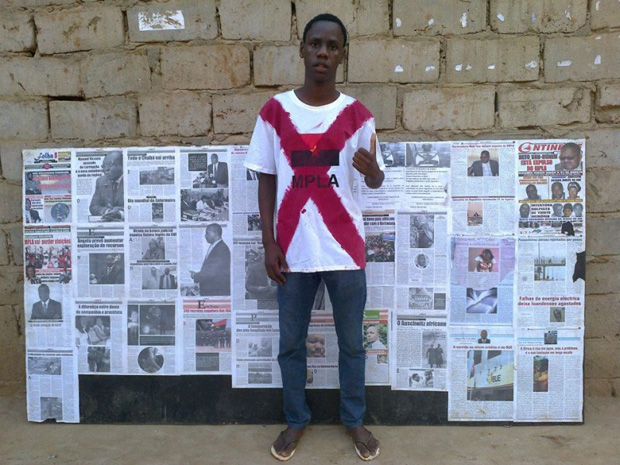
Manuel Chivonde Nito Alves was held in solitary confinement for printing t-shirts. Image from his Facebook page.
Angolan 17-year-old Manuel Chivonde Nito Alves went on hunger strike on Tuesday, following his arrest on 12 September for printing t-shirts with the slogan “Out Disgusting Dictator”. The message was aimed at the country’s President Jose Eduardo dos Santos, who has held power in since 1979. The shirts were to be worn at a demonstration in the capital Luanda, highlighting corruption, forced evictions, police violence and lack of social justice under dos Santos’ regime. Nito Alves has been charged with “insulting the president”, and has now spent almost two months in detention – parts of it in solitary confinement. His family were barred from seeing him, and three weeks went by before he was allowed to speak to a lawyer. The hunger strike is in protest at his “unjust and inhumane treatment”.
2) Belarus
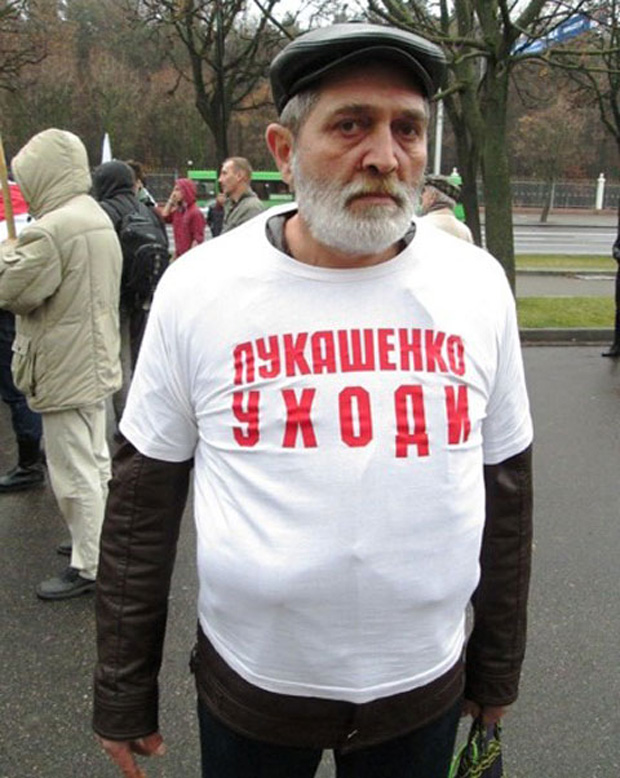
Yury Rubstow wearing the t-shirt that landed him in prison. (Image Viasna Human
Rights Centre)
On Monday, Belarusian opposition activist Yury Rubstow was sentenced to three days in jail for wearing a t-shirt with the slogan “Lukashenko, go away” on the front, and “A four-time president? No. This is not a president but an impostor tsar” on the back.” The message was aimed at the country’s dictator Alexander Lukashenko, during an opposition protest march. He was found guilty of disobedience to police officers under Article 23.4 of the Civil Offenses Code.
3) Swaziland
In 2010, Sipho Jele, a member of Swaziland’s People’s United Democratic Movement, was arrested for wearing a t-shirt supporting the party during a May Day parade. He was arrested under the country’s Suppression of Terrorism Act, and died in custody. The police said he had hanged himself, while the party say the police of killed him.
4) Egypt
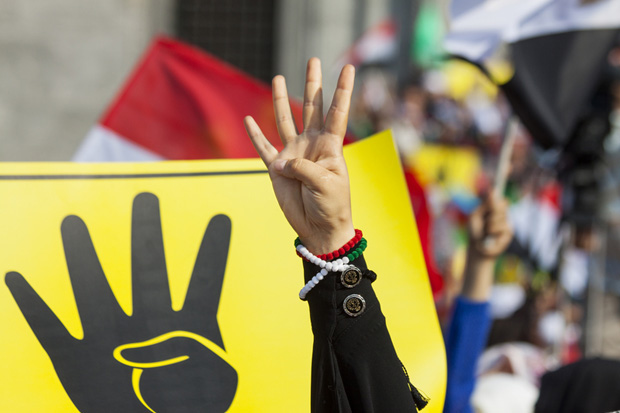
The Rabaa symbol displayed at a protest in Turkey (Image Bünyamin Salman/Demotix)
In September, three Egyptian men were arrested for wearing t-shirts emblazoned with the Rabaa symbol. A hand holding up four fingers, it is widely used by those opposing Egypt’s interim military-backed government, and the coup that ushered in in. Mohamed Youssef, the country’s kung fu champion, was also suspended by the national federation for wearing a similar t-shirt during a medal ceremony.
5) Hong Kong
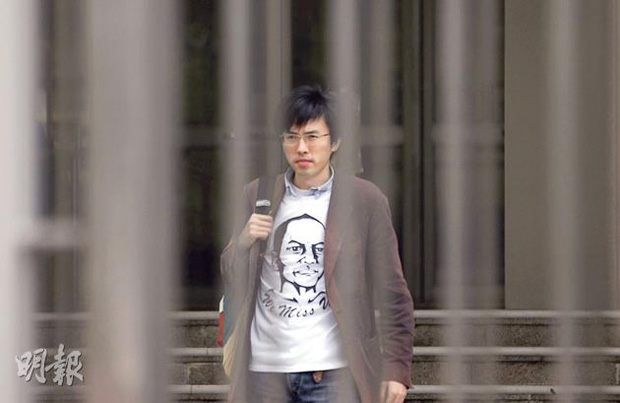
Avery Ng wearing the t-shirt he threw at Hu Jintao. Image from his Facebook page.
An activist from Hong Kong was arrested last December for throwing a t-shirt at former Chinese president Hu Jintao during an official visit almost six month earlier, on 1 July. League of Social Democrats Vice Chairman Avery Ng threw a t-shirt with a drawing of the late Chinese dissident Li Wangyang, a Tiananmen Square activist who died under suspicious circumstances only weeks before the visit. Ng was charged “with nuisance crimes committed in a public place”.
6) Malaysia
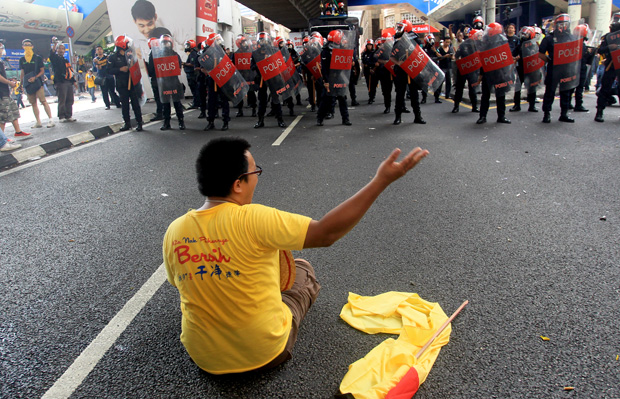
Malaysian protester wearing a Bersih shirt. (Image Syahrin Abdul Aziz/Demotix)
In June 2011, Malaysian police arrested 14 opposition activists for wearing t-shirts promoting a rally in Kuala Lumpur calling for election reform. The shirts carried the slogan “bersih” which means “clean”, and is the name of one of the groups behind the protest. Authorities claimed the demonstration was an “attempt to create chaos on the streets and undermine the government”, and they were therefore within their rights to arrest the protesters. They also confiscated t-shirts from the group’s headquarters.
7 & 8) The US
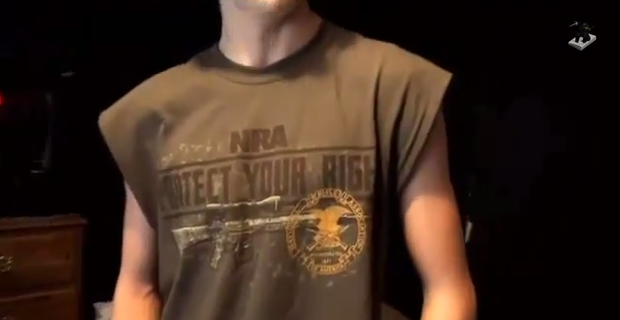
Jared Marcum wearing his NRA t-shirt in a TV report. (Image Youtube)
A 14-year-old student from West Virginia was in April suspended from school and subsequently arrested for refusing to remove a t-shirt supporting the pro-gun National Rifle Association. Jared Marcum was charged with “obstructing an officer” and faced a $500 fine and up to one year in prison.
On the flip side, a Tennessee man was arrested for wearing a t-shirt in support of stricter gun control laws. Stanley Bryce Myszka was wearing a shirt that read “Has your gun killed a kindergartener today?” at a shopping centre, following the shooting at Sandy Hook Elementary School. He was approached by security guards, who called the police when he when he refused to remove the shirt. He was also banned from the shopping centre for life.
9) United Kingdom

The front of Barry Thew’s t-shirt. (Image Greater Manchester Police)
A Manchester man was in October 2012 sentenced to eight months in prison in part for wearing a t-shirt emblazoned with offensive comments referencing the murders of two policewomen. Barry Thew had written “One less pig; perfect justice” on the front of his t-shirt and “killacopforfun.com haha” on the back. While four months of the sentence was handed down for breach of a previous suspended sentence, he was charged on a Section 4A Public Order Offence for the t-shirt incident.
7 Nov 2013 | Awards, Awards year slider
[vc_row full_width=”stretch_row_content_no_spaces” css_animation=”fadeIn” css=”.vc_custom_1485788709813{padding-top: 250px !important;padding-bottom: 250px !important;background-image: url(https://www.indexoncensorship.org/wp-content/uploads/2016/10/2013-logo-1460×490.png?id=80253) !important;background-position: center !important;background-repeat: no-repeat !important;background-size: cover !important;}”][vc_column][/vc_column][/vc_row][vc_row css=”.vc_custom_1472525914065{margin-top: -150px !important;}”][vc_column][vc_row_inner equal_height=”yes” content_placement=”middle”][vc_column_inner el_class=”awards-inside-desc” width=”1/2″][vc_custom_heading text=”FREEDOM OF EXPRESSION AWARDS 2013″ use_theme_fonts=”yes”][vc_column_text]Index on Censorship’s Freedom of Expression Awards exist to celebrate individuals or groups who have had a significant impact fighting censorship anywhere in the world.
- Awards were offered in four categories: Arts, Campaigning, Digital Activism and Journalism
- Winners were honoured at a gala celebration in London at the Inner Temple
[/vc_column_text][/vc_column_inner][vc_column_inner width=”1/2″][vc_video link=”https://www.youtube.com/watch?v=GUWv8_bOXgg”][/vc_column_inner][/vc_row_inner][/vc_column][/vc_row][vc_row css=”.vc_custom_1472608310682{margin-top: 0px !important;margin-bottom: 20px !important;}”][vc_column][vc_custom_heading text=”WINNERS” font_container=”tag:h1|text_align:center” use_theme_fonts=”yes” css=”.vc_custom_1477036676595{margin-top: 0px !important;}”][vc_row_inner][vc_column_inner width=”1/3″][staff name=”Malala Yousafzai” title=”Advocacy Award” color=”#28a7cc” profile_image=”60802″]Malala Yousafzai, Pakistani education campaigner, who received global attention for her courage in standing up to the Taliban and her defense of girls’ education. Malala’s father, Ziauddin Yousafzai, accepted the award on his daughter’s behalf saying: “I want to give a message to the world. I didn’t do anything special. As a father, I did one thing, I gave her the right of freedom of expression. All fathers and mothers, give your daughters and sons freedom of expression. Freedom of expression is a most important right. The solution of any conflict is to say the right thing, to speak the truth.”[/staff][/vc_column_inner][vc_column_inner width=”1/3″][staff name=”Kostas Vaxevanis” title=”Journalism Award” color=”#28a7cc” profile_image=”80366″]Kostas Vaxevanis, Greek investigative journalist, who published a list of more than 2,000 suspected tax evaders, drawing international condemnation. Accepting the award, Kostas said: “Journalism has been either invested with magic powers, or has been blamed for everything. Both positions are wrong. Journalism is the way, lonely most of the times, of truth.”[/staff][/vc_column_inner][vc_column_inner width=”1/3″][staff name=”Bassel Khartabil” title=”Digital Activism Award” color=”#28a7cc” profile_image=”71068″]Bassel Khartabil, Syrian internet activist believed to have been arrested for his work as a computer engineer, specializing in the development of open source software. Accepting the award on his behalf, his friend Dana Trometer said: “Bassel is aware of this award and he would like to thank the judges and audience for trusting him with such an honour. He would also like to pay respect to all the victims of the struggle for freedom of speech, and, especially for those non-violent youths who refused to carry arms and deserve all the credit for this award.”[/staff][/vc_column_inner][/vc_row_inner][vc_row_inner][vc_column_inner width=”1/3″][staff name=” Zanele Muholi” title=”Arts Award” color=”#28a7cc” profile_image=”81033″]Zanele Muholi, South-African photographer and LGBT activist whose work focuses on gender and sexual identity in post-Apartheid South Africa. Dedicating the award to two friends who were victims of hate crimes and later succumbed to HIV complications, Muholi said: ‘To all the activists, gender activists, visual activists, queer artists; writers, poets, performers, art activists, organic intellectuals who use all art forms of expressions in South Africa. The war is not over till we reach an end to ‘curative rapes’ and brutal killing of black lesbians, gays and transpersons in South Africa.’[/staff][/vc_column_inner][vc_column_inner width=”1/3″][/vc_column_inner][vc_column_inner width=”1/3″][/vc_column_inner][/vc_row_inner][/vc_column][/vc_row][vc_row][vc_column][vc_custom_heading text=”JUDGING” font_container=”tag:h1|text_align:center” use_theme_fonts=”yes”][vc_row_inner el_class=”mw700″][vc_column_inner][vc_column_text]
Criteria – Anyone involved in tackling free expression threats – either through journalism, campaigning, the arts or using digital techniques – is eligible for nomination.
Any individual, group or NGO can nominate or self-nominate. There is no cost to apply.
Judges look for courage, creativity and resilience. We shortlist on the basis of those who are deemed to be making the greatest impact in tackling censorship in their chosen area, with a particular focus on topics that are little covered or tackled by others.
Nominees must have had a recognisable impact in the past 12 months.
Where a judge comes from a nominee’s country, or where there is any other potential conflict of interest, the judge will abstain from voting in that category.
Panel – Each year Index recruits an independent panel of judges – leading world voices with diverse expertise across campaigning, journalism, the arts and human rights.
The judges for 2013 were:
[/vc_column_text][/vc_column_inner][/vc_row_inner][vc_row_inner][vc_column_inner width=”1/3″][staff name=”Maya Wolfe-Robinson” title=”Commissioning editor, The Guardian” color=”#28a7cc” profile_image=”80226″]Maya Wolfe-Robinson is a Guardian commissioning editor for video and opinion.[/staff][/vc_column_inner][vc_column_inner width=”1/3″][staff name=”Sandy Nairne” title=”Director, National Portrait Gallery” color=”#28a7cc” profile_image=”80227″]Alexander Robert “Sandy” Nairne CBE FSA is an English historian and curator. From 2002 until February 2015 he was the director of the National Portrait Gallery.[/staff][/vc_column_inner][vc_column_inner width=”1/3″][staff name=”Ziyad Marar” title=”Global publishing director, Sage Publications” color=”#28a7cc” profile_image=”80225″]Ziyad Marar is an author and editorial director in the UK. He was born in 1966 in Iraq, and moved to London aged 10. He has published three books and as of 2013 was Deputy Managing Director and Executive Vice President / Global Publishing at SAGE Publications.[/staff][/vc_column_inner][/vc_row_inner][vc_row_inner][vc_column_inner width=”1/3″][staff name=”Felix Tréguer” title=”Co-founding member, La Quadrature du Net” color=”#28a7cc” profile_image=”80224″]Felix Tréguer is a researcher, a French activist and a co-founding member of La Quadrature du Net.[/staff][/vc_column_inner][vc_column_inner width=”1/3″][/vc_column_inner][vc_column_inner width=”1/3″][/vc_column_inner][/vc_row_inner][/vc_column][/vc_row][vc_row css=”.vc_custom_1473325552363{margin-top: 0px !important;margin-bottom: 20px !important;padding-top: 0px !important;padding-right: 15px !important;padding-bottom: 0px !important;padding-left: 15px !important;}”][vc_column css=”.vc_custom_1473325567468{margin-top: 0px !important;margin-bottom: 0px !important;padding-top: 0px !important;padding-bottom: 0px !important;}”][awards_gallery_slider name=”GALLERY” images_url=”80386,80384,80383,80382,80381,80385,80380,80379,80378,80377,80376,80374,80373,80372,80370,80369,80371,80368,80367,80366,80365,80364,80363,80362,80361,80360,80359,80358,80357,80356,80355,80354,80353,80352,80351,80350,80349,80348″][/vc_column][/vc_row]
6 Nov 2013 | About Index, Campaigns, Press Releases
Index on Censorship supports today’s court challenge to the use of counter-terrorism powers to detain David Miranda at Heathrow airport in August. Index is a member of a coalition of free speech and media organisations that has made a written submission in support of Miranda’s hearing.
Online Editor Sean Gallagher said:
‘The Terrorism Act should be used to counter terrorism not to undermine investigative journalism into stories that are in the public interest, such as the ongoing revelations about mass surveillance by The Guardian and David Miranda’s partner, Glenn Greenwald. Misusing counter terrorism laws in this way is an attack on the free expression rights of journalists and their sources.’
The judicial review case will decide if it was lawful to use Schedule 7 of the Terrorism Act to detain Miranda and take confidential materials from him.
Written Submissions of the Coalition of Media and Free Speech Organisatons







